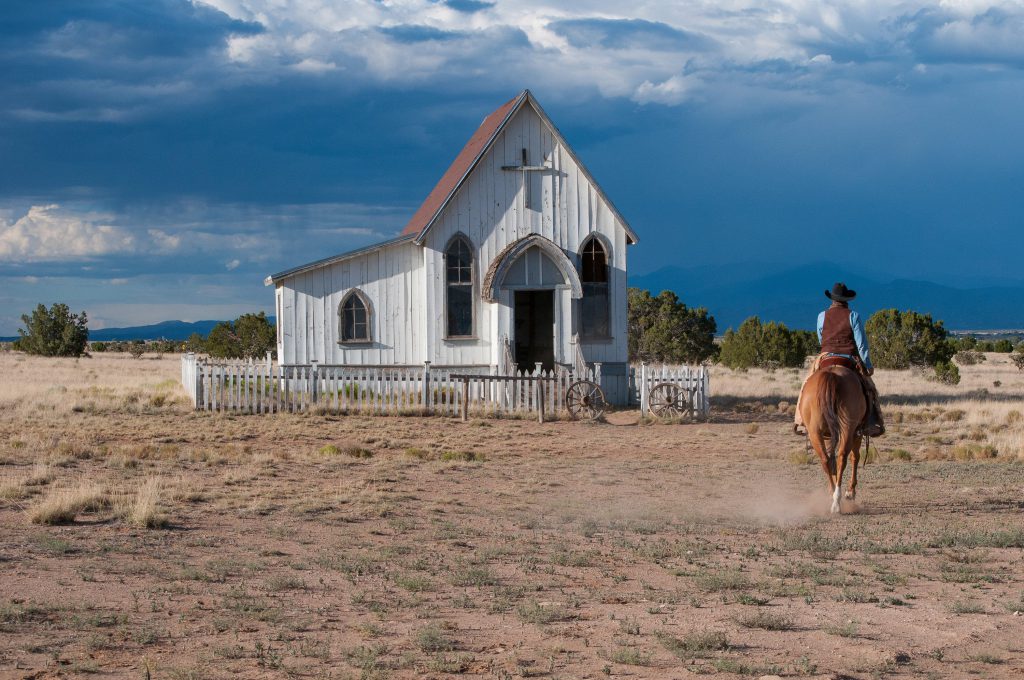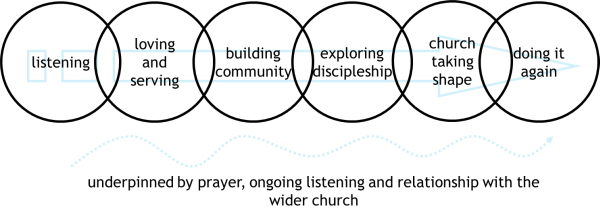So you’ve just heard about Fresh Expressions. Maybe it was from a friend who’s into church planting. Maybe your bishop or pastor has been talking about it. Or maybe someone shared a blog post from someone involved in the movement. With so many church planting models floating around out there, you may be wondering what’s so special about Fresh Expressions.
What Is a Fresh Expression?
A report by the Church of England set the official definition as “a form of church for our changing culture, established primarily for the benefit of people who are not yet members of any church.” The report goes on to describe a fresh expression of church by saying,
- “It will come into being through principles of listening, service, incarnational mission and making disciples,” and
- “It will have the potential to become a mature expression of church shaped by the gospel and the enduring marks of the church and for its cultural context.”
Fresh expressions are contextual Christian churches formed among those who are not yet members of any church. They are not steppingstones to church. They’re not church lite. They are church.
Fresh expressions are contextual churches formed among those who aren't yet members of any church.
Tweet this.
Why Is the Fresh Expressions Movement Important?
According to Alan Hirsch, “around 60 percent of America’s population is increasingly alienated from the prevailing forms of church.” This means that the Sunday morning worship service, no matter how amazing the music is, or how cool the preacher is, will only be able to reach 40 percent of the population. Yet, the American church pours the vast majority of its resources into these prevailing forms of church.
For over a decade, church planters like Hirsch have been pushing the American church to explore new forms of church that can relate to the 60 percent. There has been great success among some denominations and church planting networks. However, traditional mainline denominations had not caught on to the importance of exploration until Fresh Expressions came along.
What these traditional denominations were looking for is what Archbishop Rowan Williams calls the “mixed economy of church.” According to Michael Moynagh, author of Being Church, Doing Life, the mixed economy is the “vision of new and existing expressions of church working together in mutual encouragement and support.” Denominations such as the United Methodist Church, the Catholic Church, and countless others are now seeing new forms of church not as a threat, but as a movement that can come alongside the existing church, reach new people, and strengthen existing churches and denominations.
Fresh Expressions brings together the movement of innovative church planters with the experience of traditional denominations, creating an exciting future for the American church.
Fresh Expressions marries innovative church planting w/the experience of traditional denominations.
Tweet this.
A Brief History of the Movement
The Fresh Expressions movement emerged out of the Anglican and Methodist churches in the United Kingdom in 2004. The term fresh expressions came from the Mission Shaped Church report, which reported on the convergence of multiple movements of new forms of church in the UK into one movement. Leaders in the movement were drawn to the Declaration of Assent found in the Anglican tradition, which calls the church to “proclaim the faith afresh in each generation.” Thus, the movement became known as Fresh Expressions.
The Fresh Expressions movement has exploded in the UK, with over 3,000 fresh expressions started in multiple denominations. According to one report, in a typical week, 10% of people attending Anglican churches can be found in a fresh expression. A great deal of training and a denomination’s resources in the UK are now devoted to fresh expressions of church.
In 2010, The movement began taking shape in the US through the vision and generosity of the Baptist General Association of Virginia, a missions and ministry association of 1,400 churches in Virginia and a dozen other states. The first Fresh Expressions National Gathering was held in 2012, with leaders from twenty national and regional denominational groups being represented. From the outset, the Fresh Expressions movement has been committed to becoming a national, cross-denominational movement.
Fresh Expressions has been committed to becoming a national, cross-denominational movement.
Tweet this.
The Foundations of a Fresh Expression
There are four main building blocks that make up a fresh expression. (In full disclosure, I have adapted each of these from Michael Moynagh’s excellent contributions to our understanding of the movement as a whole.)
Missional
A fresh expression works mainly with people who do not attend church
Fresh expressions are not Bible studies for church people in unique places. They are church for people who do not attend church. We recognize that people are no longer coming to us; we must go to them and create new forms of church in society.
Contextual
A fresh expression finds culturally appropriate ways of reaching people
Emerging fresh expressions want to know who is not connected to the church and how those persons might be comfortable in a gathering. With this kind of consideration, fresh expressions have started in pubs, skate parks, living rooms, and wherever people outside the church are. Fresh expressions often emerge among affinity groups.
Formational
A fresh expression aims to form disciples
As communities begin to form, fresh expressions begin exploring discipleship. Discipleship in fresh expressions varies from formal learning in discussions to social learning inside the close proximity of life lived together.
Ecclesial
A fresh expression intends to become church for the people it reaches in its context
Fresh expressions are not “ministries” of a church, they are church. While they might not have all of the marks of a mature church, they have the intention of eventually becoming a mature expression of church.
Fresh expressions are not “ministries” of a church, they are church.
Tweet this.
How to Start a Fresh Expression
When it comes to starting a fresh expression, there are several key stages to be aware of. Just as I borrowed from the wisdom of Michael Moynagh in the previous section, here I borrow from the wisdom of Fresh Expressions UK.
Listening
Fresh expressions of church begin by asking these questions:
- Who in my community is not connected to the church?
- How are they already gathering?
- To which group of people do I feel called?
As we begin to hear our community’s answers to these questions, ideas of a new fresh expression will emerge.
Loving/Serving
The next step focuses on building meaningful relationships with people who do not attend church. To start a fresh expression among our neighbors outside the church we must first get to know them. This can happen through attending community events, hosting potlucks, doing service projects, and other community-building activities.
Building Community
As relationships are being built, a group with a specific identity begins to form. The group begins to meet regularly. Many of these groups begin with a few Christians who are comfortable around non-Christians, and they grow by bringing in non-Christian friends.
Exploring Discipleship
In this stage, the group begins to explore the Christian faith. This occurs, as stated earlier, through formal learning (intentional discussions) and social learning (life in close proximity).
Church Taking Shape
The Church of Scotland defined the core calling of the church as “[being] people with Jesus at the centre, travelling wherever Jesus takes us.” As a new fresh expression takes shape, the group will identify how it can participate in this calling. Marks of the church, such as proclamation or the sacraments, begin emerging, although they may look different in fresh expressions. The hope is that the group will eventually become a mature expression of the Church with all the marks of her.
Do It Again
Ideally, fresh expressions multiply. People who join the original group may be inspired to start another fresh expression. Some fresh expressions are connected through networks hosted by larger, established churches.
What’s Your Next Step?
As you can see, starting a fresh expression of church is a pretty natural thing, and Fresh Expressions US has been a perfect ally for us here at King Street Church. The main thing to do now is just take a next step.
Fresh Expressions US has numerous ways to help with that. Consider participating in a Vision Day near you, or join a Pioneer Learning Community. And definitely check out the resources available through Fresh Expressions. Whatever it may be, may God bless your next step.



